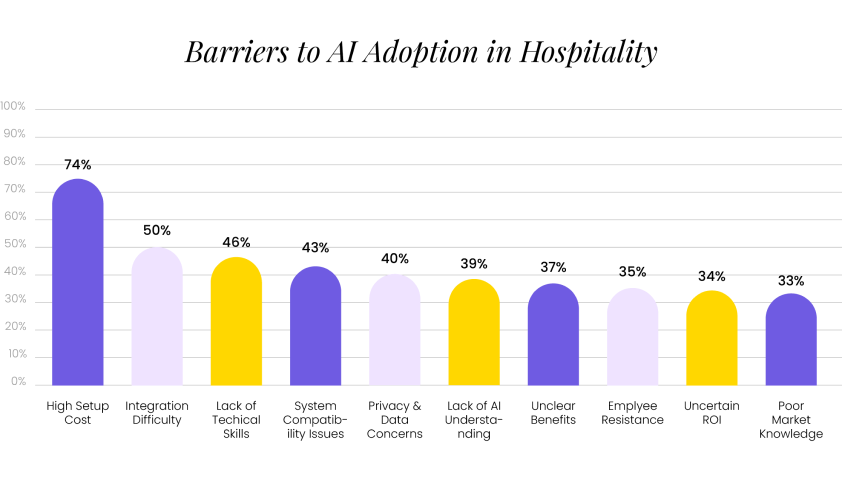Artificial Intelligence (AI) has quickly moved from buzzword to business reality in the travel and hospitality world. Once the stuff of sci-fi dreams, AI is now powering everything from hotel pricing algorithms to virtual concierges. But how exactly is AI shaping the hotel industry today, and what separates hype from reality? Recent data and research to uncover the real impact of AI in hospitality, and how these innovations will and are influencing hotel operations and the guest experience.
From Hype to Reality: Rising AI Adoption in Hospitality
Globally, industry data suggests we’ve reached a tipping point where roughly half of hoteliers are actively integrating AI tools. A Statista survey noted that 50% of hotels planned to integrate AI by 2024. The hotel industry’s spending on AI is projected to grow from $150 million in 2024 to $240 million in 2025, with longer-term forecasts reaching $8 billion by 2033 (HotelTechReport).
The driving force? Hotels are facing new challenges—from labor shortages to evolving guest expectations—and AI offers a way to do more with less: automate repetitive tasks, improve efficiency, and personalize service at scale.
Where Hotels Are Using AI Today
AI-powered chatbots and virtual assistants
Among the most guest-facing applications, AI chatbots and virtual assistants are reshaping how hotels communicate with travelers. These tools can instantly respond to guest inquiries, assist with bookings, provide local recommendations, and even automate service requests. Modern generative AI models make these interactions feel conversational and natural.
Hotels deploying AI chat are seeing measurable results. Guests get immediate answers, and staff are freed from repetitive tasks. Adoption is growing, particularly as tools become more accurate, multilingual, and integrated into property systems. AI chat also allows hotels to offer 24/7 service without increasing headcount, making it an appealing entry point into AI.
AI content generation
Hoteliers are increasingly turning to tools like ChatGPT to create marketing content, property descriptions, and templated guest messages. This not only saves time but enables more personalized, consistent communications. 74% of AI-using hotels report using content generation tools (HES-SO).
Online review analysis
Managing guest feedback is essential, and AI helps by analyzing large volumes of reviews to extract sentiment and identify common trends. This allows hoteliers to spot issues, respond faster, and improve service. 44% of AI-adopting hotels are using tools for review analytics (HES-SO).
Revenue management and dynamic pricing
AI models can analyze competitor pricing, demand patterns, and booking trends to suggest optimal room rates in real time. This kind of pricing intelligence boosts revenue and helps hotels respond to market shifts with agility. 42% of hotels with AI have implemented revenue optimization tools (HES-SO).
Guest personalization engines
AI is helping hotels deliver tailored experiences by analyzing guest preferences and past behavior. From suggesting upgrades to customizing welcome messages, personalization tools increase guest satisfaction and loyalty. 38% of AI adopters are using this approach (HES-SO).
Predictive analytics
Forecasting occupancy, demand, and even maintenance needs is becoming easier with AI. Predictive analytics allow hoteliers to anticipate trends and make proactive decisions, improving operational planning and resource allocation.
The Guest Perspective: Convenience, Control, and Personalization
Travelers increasingly expect seamless digital interactions—and AI is delivering. A survey from SiteMinder found that 78% of travelers want to use AI at some point during their accommodation journey. But only 12% are comfortable with AI-only service. The key is balance: guests want convenience and control, but still value human interaction.
Self-service options like mobile check-in and AI chat support allow guests to bypass friction points like lobby wait times. These tools are especially popular with younger travelers and help hotels reduce queues while increasing upsell opportunities. Personalization further enhances loyalty—travelers are more likely to return when their preferences are remembered.
What’s Holding Hotels Back?

Despite the promise, barriers remain. According to the HES-SO Valais-Wallis survey, the top challenges hoteliers face in adopting AI include high setup costs (74%), difficulty integrating AI into existing processes (50%), lack of technical skills to use AI (46%), compatibility issues with existing systems (43%), concerns about customer data privacy (40%), and a general lack of understanding of AI (39%). Other barriers cited include limited knowledge of AI solutions on the market (33%), uncertain ROI (34%), and employee resistance to change (35%).
To move forward, hoteliers should focus on tangible, achievable steps that fit within their current operational realities. This might include piloting a chatbot for handling common guest questions, using AI to analyze online reviews, or experimenting with predictive pricing tools. Just as important is rethinking outdated systems: legacy platforms that require constant patching or siloed solutions that don’t communicate well are often the biggest obstacles to progress.
Adopting modern, all-in-one guest experience platforms that seamlessly integrate AI capabilities can reduce friction across the guest journey. These tools are increasingly designed for fast onboarding, intuitive use, and smooth integration with existing systems—empowering staff to work smarter, not harder. Instead of stitching together point solutions, hotels can benefit from centralized platforms that unify messaging, upsells, personalization, and automation under one roof. This creates more efficient workflows, better service consistency, and a more connected experience for both staff and guests.
As more hoteliers embrace this new generation of tech, the benefits become clear: improved operational efficiency, reduced training time, higher guest satisfaction, and a measurable boost in revenue. The key is to choose solutions that solve real problems today, while setting the foundation for scalable innovation tomorrow.
Want to see how AI can streamline your operations and elevate the guest experience?
Book a Demo
About the author
The Duve team comprises hospitality experts specializing in guest experience personalization, operational optimization, and innovative hotel technologies. With deep industry knowledge, they help hospitality providers elevate service, enhance satisfaction, and drive growth.